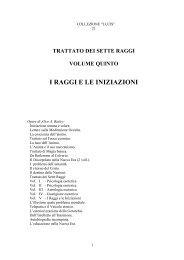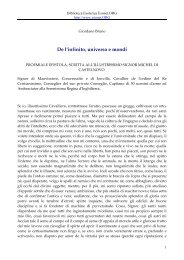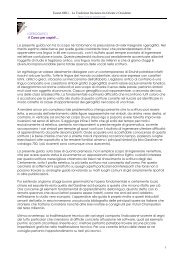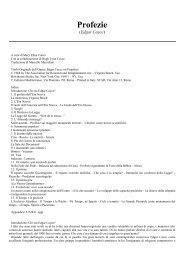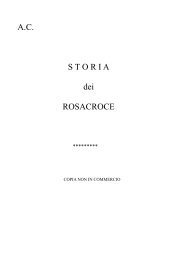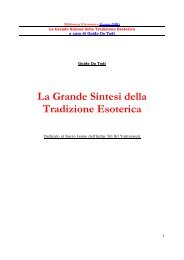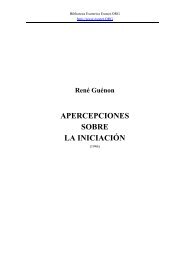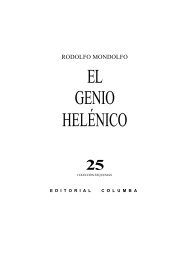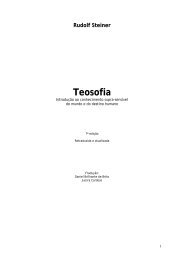Biblioteca Esoterica Esonet.ORG http://www.esonet.ORG 1
Biblioteca Esoterica Esonet.ORG http://www.esonet.ORG 1
Biblioteca Esoterica Esonet.ORG http://www.esonet.ORG 1
You also want an ePaper? Increase the reach of your titles
YUMPU automatically turns print PDFs into web optimized ePapers that Google loves.
<strong>Biblioteca</strong> <strong>Esoterica</strong> <strong>Esonet</strong>.<strong>ORG</strong><br />
<strong>http</strong>://<strong>www</strong>.<strong>esonet</strong>.<strong>ORG</strong><br />
The Principle of Holarchy and<br />
the Interplay of Horizontal and Vertical Relationships - 5<br />
The formation of groups: Family and peer groups<br />
The importance of groups in modern society is increasing. But contemporary theories of<br />
group formation and group interactions are dominated by individualistic, egalitarian, and<br />
idealistic attitudes. These attitudes also are reflected in the approach taken by modern<br />
science for several centuries to explain the development of the universe. From the<br />
astrophysical point of view, the universe evolved after an unexplained — and<br />
unexplainable — enormous release of energy that almost at once transformed itself into<br />
some kind of protomatter. The original space then filled with an immense number of<br />
particles which, unorganized and moving at random, yet according to "laws" whose origin<br />
also is unexplained, eventually came together, forming increasingly large units. Evolution<br />
is therefore the result of a constantly more inclusive aggregation or gradual organization<br />
of elements which all operate at the same general level of existence. Evolution is a one-way<br />
process. At the sociocultural level it has been glorified as "progress." But can one explain<br />
this progress simply on the basis of a more or less fortuitous "coming together" of elements<br />
— be they atoms, molecules, or human beings?<br />
In the mid-eighteenth century the French-Swiss philosopher Jean Jacques Rousseau<br />
took great pains to try to show that primitive societies were formed as the result of a<br />
"social contract" in which all the would-be members agreed to follow at least basic rules.<br />
Perhaps he was influenced by the event that took place about two hundred years earlier<br />
on the Mayflower — the signing of the contract by the Pilgrims who were escaping<br />
religious persecution in their native land. However, in the light of what is known of<br />
primitive societies and of the gradual emergence of human faculties out of the<br />
unconscious depths of animal instincts, Rousseau's concept is senseless. The process of<br />
formation of any society is dominated first by biological facts and needs. Only later do the<br />
results of the participants' conscious and deliberate interactions become dominant. To a<br />
very large extent, the character of the associative relationships that develop through<br />
cooperative activity results from the nature of a particular environment which the original<br />
settlers did not choose, but to which they were compulsively attracted.<br />
Even more incontrovertibly, the same is true of the relationship between newborn<br />
babies and their parents. This is a compulsive as well as vertical relationship, in the sense<br />
that the parents fundamentally act — or at least should act in all societies operating in a<br />
natural manner — not as individuals but as beings charged with the perpetuation of the<br />
human species. Through its parents the newborn is related to homo sapiens, first in a<br />
strictly biological sense, then at the sociocultural level in terms of the religion and culture<br />
to which the parents belong and which it is (or until recently was felt to be) their religious<br />
and social duty to perpetuate through their progeny. Therefore, the parent-child<br />
relationship should not be considered essentially horizontal. Horizontal relationships<br />
begin when siblings are present; but these occur within the theoretically well-defined field<br />
of activity constituted by the family.<br />
142



